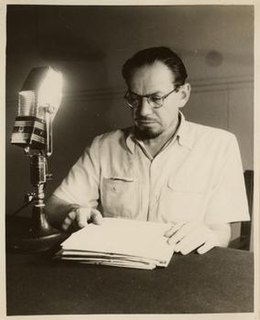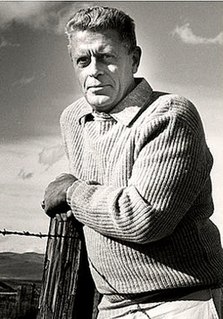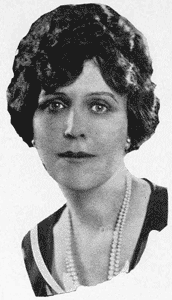A Quote by Muhammad Asad
But who, except God, can say whether a man is right or foolish if he follows the call of his conscience?
Related Quotes
A man follows the path laid out for him. He does his duty to God and his King. He does what he must do, not what pleases him. God's truth, boy, what kind of world would this be if every man did what pleased him alone? Who would plough the fields and reap the harvest, if every man had the right to say, 'I don't want to do that.' In this world there is a place for every man, but every man must know his place.
True law, the code of justice, the essence of our sensations of right and wrong, is the conscience of society. It has taken thousands of years to develop, and it is the greatest, the most distinguishing quality which has developed with mankind ... If we can touch God at all, where do we touch him save in the conscience? And what is the conscience of any man save his little fragment of the conscience of all men in all time?
Draw nigh to the righteous, and through them you will draw nigh to God. Communicate with those who possess humility, and you will learn morals from them. A man who follows one who loves God becomes rich in the mysteries of God; but he who follows an unrighteous and proud man gets far away from God, and will be hated by his friends.
What is a great man who has made his mark upon history? Every time, if we think far enough, he is a man who has looked through the confusion of the moment and has seen the moral issue involved; he is a man who has refused to have his sense of justice distorted; he has listened to his conscience until conscience becomes a trumpet call to like-minded men, so that they gather about him, and together, with mutual purpose and mutual aid, they make a new period in history.
We may gamble on outsmarting the law; we may even gamble on the leniency of man and the mercy of God-but no man ever won a gamble with his own conscience. Even should he think he has beaten his conscience into submission, his misdeeds still leave their mark upon him. Anyone who gambles against this fact has already lost his gamble.
There comes the baffling call of God in our lives also. The call of God can never be stated explicitly; it is implicit. The call of God is like the call of the sea, no one hears it but the one who has the nature of the sea in him. It cannot be stated definitely what the call of God is to, because his call is to be in comradeship with himself, for his own purposes, and the test is to believe that God knows what he is after.
In the present age, man proves his separation from his Creator by his spirit of self-sufficienc y and positive rejection of God. The present issue between God and man is one of whether man will accept God's estimate of him, abandon his hopeless self-struggle, and cast himself only on God who alone is sufficient to accomplish his needed transformation.
By His gracious condescension God became man and is called man for the sake of man and by exchanging His condition for ours revealed the power that elevates man to God through his love for God and brings God down to man because of His love for man. By this blessed inversion, man is made God by divinization and God is made man by hominization. For the Word of God and God wills always and in all things to accomplish the mystery of His embodiment.
That in all capital or criminal prosecutions a man bath a right to demand the cause and nature of his accusation, to be confronted with the accusers and witnesses, to call for evidence in his favor, and to a speedy trial by an impartial jury of twelve men of his vicinage, without whose unanimous consent he cannot be found guilty; nor can he be compelled to give evidence against himself; that no man be deprived of his liberty, except by the law of the land or the judgment of his peers.
Who stands firm? Only the one for whom the final standard is not his reason, his principles, his conscience, his freedom, his virtue, but who is ready to sacrifice all these, when in faith and sole allegiance to God he is called to obedient and responsible action: the responsible person, whose life will be nothing but an answer to God's question and call.
































